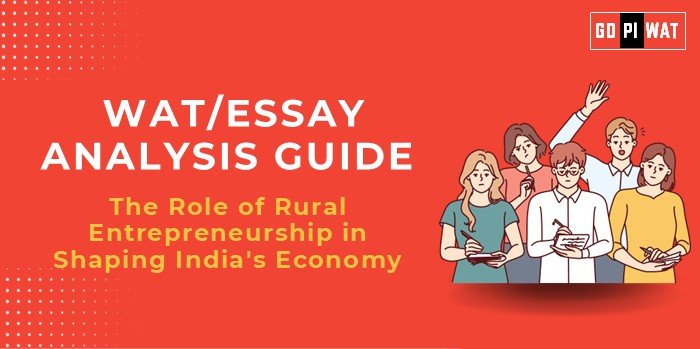📋 Written Ability Test (WAT) Analysis Guide
Topic: The Role of Rural Entrepreneurship in Shaping India’s Economy
🌟 Understanding the Topic’s Importance
Rural entrepreneurship is vital for inclusive economic growth, reducing urban-rural disparities, and achieving sustainable development. For B-schools, this topic underscores the interplay between economic policies, social empowerment, and business strategies.
⏱️ Effective Planning and Writing
- Time Allocation:
- 📝 Planning: 5 minutes
- ✍️ Writing: 20 minutes
- 🔍 Review: 5 minutes
💡 Introduction Techniques
- Contrast Approach:
“While rural areas account for 65% of India’s population, they contribute less proportionally to its GDP due to limited entrepreneurship opportunities. Unlocking this potential through targeted initiatives can transform India’s economy.”
- Solution-Based Approach:
“Rural entrepreneurship offers a pathway to economic self-reliance, bridging the urban-rural divide and promoting inclusive growth through innovative business models.”
- Global Perspective Approach:
“India can draw inspiration from global examples like China’s rural industrialization to empower its entrepreneurs, aligning with the vision of an Atmanirbhar Bharat.”
📊 Structuring the Essay Body
🏆 Paragraph 1: Achievements
- 📈 Financial Inclusion: The PMMY has disbursed loans exceeding ₹5.20 lakh crore in FY24, creating a supportive environment for rural startups.
- 🌐 Market Integration: E-commerce penetration in rural India has expanded by 30% annually, providing global market access to local products.
- 🎓 Skill Development: Over 4.4 million youth trained under RSETIs, with a settlement rate of 70%.
⚠️ Paragraph 2: Challenges
- 🏗️ Infrastructure Deficits: Poor roads, unreliable power, and low internet penetration restrict business growth.
- 💰 Financial Barriers: Despite schemes like Mudra Yojana, many entrepreneurs lack awareness and face collateral challenges.
- 🔄 Market Saturation: Rural businesses often rely on traditional products with limited innovation.
🚀 Paragraph 3: Future Perspective
- 📶 Digital Integration: Expanding digital literacy and internet access can revolutionize rural markets.
- 🤝 Public-Private Partnerships: Collaborations between the government and corporates can address infrastructure gaps.
- 📜 Policy Enhancements: Simplifying loan processes and offering mentorship programs can boost rural enterprises.
📄 Concluding Effectively
- Balanced Conclusion:
“Rural entrepreneurship has achieved remarkable success but remains hindered by infrastructure and market challenges. Focused interventions in these areas will unlock its full potential and drive India’s economic transformation.”
- Global Example Conclusion:
“Drawing lessons from China’s rural industrialization and Bangladesh’s microfinance model, India can strengthen its rural entrepreneurship ecosystem, fostering inclusive growth and global competitiveness.”
✍️ Sample Short Essays
- Balanced Perspective:
“Rural entrepreneurship plays a pivotal role in reducing economic inequalities and fostering inclusive growth. While achievements like financial inclusion and skill development are noteworthy, challenges like poor infrastructure and market access hinder progress. Bridging these gaps through targeted policies will unlock the immense potential of rural enterprises.”
- Solution-Oriented:
“Empowering rural entrepreneurs through digital tools, financial literacy, and public-private partnerships is key to driving sustainable economic growth. Government initiatives like Mudra Yojana and ONDC have set the foundation, but scaling these efforts will ensure India’s rural sectors contribute significantly to global markets.”
- Global Comparison:
“India can emulate China’s success in rural industrial clusters and Bangladesh’s microfinance revolution to boost rural entrepreneurship. By integrating global best practices with local initiatives, India can create a robust rural economy that drives its journey toward self-reliance.”


